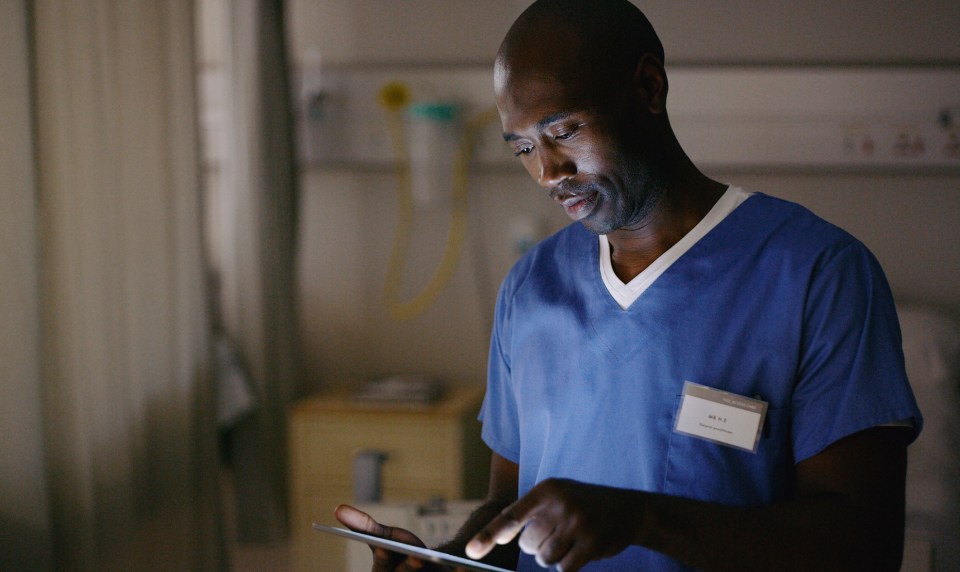Nursing informatics is a specialty that combines clinical and technological knowledge. Strategic and forward-thinking nursing informaticists focus on how to analyze clinical data, standardize documentation, decrease variations in care, increase cost savings and improve clinical workflows.
“This specialty can seem complicated from the outside because it straddles the lines between clinical care and IT,” said Barbara Winters-Todd, director of clinical excellence informatics for Encompass Health. “In the healthcare setting, nurses interpret the electronic medical record (EMR) and work alongside IT specialists to extract clinical data in a way that helps us analyze it more easily. I learn something new from our IT partners every day.”
How Nurses Become Informatics Specialists
Winters-Todd holds a Master of Science in nursing leadership, a post-master’s certificate in nursing informatics, and a Doctor of Nursing Practice in administration and nursing education. Needless to say, she’s an expert!
However, less than 30% of nurses hold a master’s in nursing informatics. About 40% of people in nursing informatics roles in the U.S. have a bachelor’s degree in nursing and have learned the informatics processes during day-to-day work.
“A nurse could be chosen to work on complex clinical data projects because of their deep understanding of the EMR, and end up leaning into the informatics role,” Winters-Todd said. “The most important quality is to have a love of learning and not be averse to change. Healthcare and technology are always changing.”
The most common title for this specialty is nurse informaticist or nursing informatics specialist, but you may also see titles such as clinical informatics specialist, clinical analyst or nursing educator. Nurse informaticists can also serve an organization in areas such as:
- Technology implementation
- Administration, leadership and management
- Quality and compliance initiatives/reporting
- Policy development
- Regulatory initiatives
- Clinical research
Informatics experience is useful in any role that helps develop evidence-based policies and procedures. You can learn more about this field, including job titles, responsibilities and education statistics, in the 2023 Nursing Informatics Workforce Survey from the Healthcare Information and Management Systems Society.
Informatics in Action at Encompass Health
The informatics specialty saw an uptick after the passing of the Health Information Technology for Economic and Clinical Health Act (HITECH) Act of 2009 that incentivized the use of EMRs and strengthened the security provisions of HIPAA. Prior to this act, many healthcare providers were still using paper records for certain clinical data, and there was a great need for people who could dissect the data after it was digitized.
Winters-Todd was instrumental in the creation of Encompass Health’s Quality Dashboard, an application within the Company’s proprietary data warehouse system. Prior to this tool, more than 180 clinical elements were tracked on paper. Now, clinical data is automated into a dashboard from the EMR and other in-house applications. The dashboard helps clinicians track acute-care transfer documentation, fall rates, antibiotic stewardship, pain reassessments and more, all while creating consistency with documentation by highlighting documentation or process opportunities.
“In inpatient rehabilitation, predictive models are very valuable. A large part of my job is identifying positive trends from our hospitals and then sharing those practices across Encompass Health. We’ll also know if certain measures are not being met and can easily identify where the breakdown is happening. The data will tell you,” Winters-Todd said.
As a clinical informatics director, she must also stay abreast of regulatory requirements, collaborate with Encompass Health’s national leadership boards to identify processes to support clinical documentation, train clinicians on documentation elements and workflows, and develop educational tools—among many other responsibilities.
“This is evidence-based practice. That’s why I love this work, because you get to take the data and turn it into something holistic that can improve lives,” Winters-Todd said. “The quality dashboard saves our staff a great deal of time by replacing manual processes. In healthcare, accurate data ensures that medical records, diagnoses and care planning for patients becomes precise and easier to evaluate.”
The content of this site is for informational purposes only and should not be taken as professional medical advice. Always seek the advice of your physician or other qualified healthcare provider with any questions you may have regarding any medical conditions or treatments.



